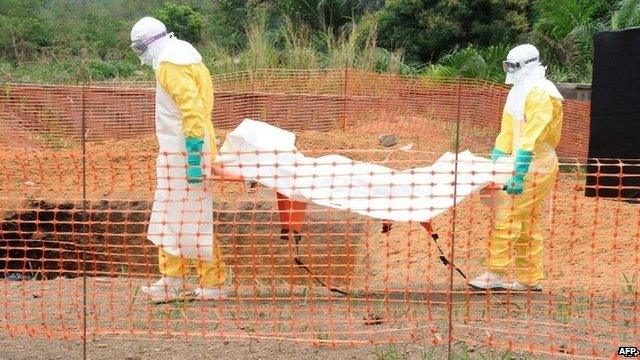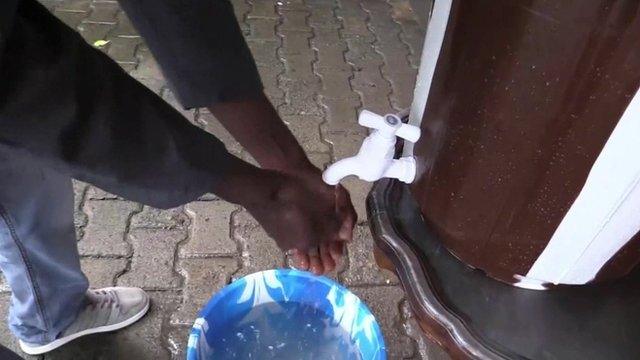Ebola virus: busting the myths
- Published
As the Ebola virus continues to spread in Sierra Leone, Liberia and Guinea, health officials are concerned that myths and misinformation may continue to spread too.
The virus has claimed more than 2,800 lives so far, and experts say a key part of fighting the disease is to make sure people are armed with the facts.
We take a look at some of the rumours surrounding Ebola - from false claims of miracle onions to condensed milk.

MYTH: Salt water or raw onions can protect you

Raw onions are not secret weapons against the disease
Salt water simply cannot stop you from catching Ebola.
In fact drinking salty water, particularly in hot conditions, can be dangerous.
The WHO says at least two people in Nigeria died from this practice, believing it could prevent them from getting the disease.
And health workers in Guinea have been asked whether eating raw onions once a day for three days or a daily drink of condensed milk can keep Ebola away.
Though having a diet of nutritious food can keep you generally healthy, raw onions and milk do not stop you getting the infection.
Ebola is spread through close contact with the bodily fluids of someone who has the disease - for example the virus is present in vomit, urine, tears or saliva.
People can help protect themselves by avoiding close contact with anyone who has signs or symptoms of the disease.

MYTH: You cannot catch Ebola from a deceased person

Close contact with deceased persons should be avoided
Even when someone has died of Ebola, the virus may still be present.
Health officials are concerned the disease might spread during traditional funeral practices that involve close contact with the deceased person.
The WHO says people who have died of Ebola must be handled using strong protective clothing and gloves, and they must be buried immediately.
Officials recommend burials should be conducted by people who have had training in how to stop the infection from spreading further.

MYTH: It cannot be caught through sexual contact
.jpg)
If a man has Ebola, the virus may be present in his bodily fluids - including his semen.
And the World Health Organization says Ebola can remain in semen for seven weeks after recovery. Other experts suggest it may be present for up to three months - even if doctors have confirmed there is no longer any viral particles in the blood.
Anyone who has had Ebola should avoid sexual intercourse or use condoms during this time.

MYTH: Health care workers brought the disease into affected countries

There has been some mistrust towards healthcare workers
There have been recent reports that health workers in Guinea were attacked because residents believed they had brought Ebola into the country.
But this was not true.
The WHO says the initial source of the Ebola virus was likely to be human contact with wild animals through hunting, butchering and preparing meat from infected wild animals.
It is possible, for example, that close contact with infected bats, shrews or small rodents passed on the disease.
During this outbreak, experts have advised people not to hunt or eat this type of bush meat.

MYTH: Expensive hand sanitizers are needed to kill the disease

Washing your hands can help stop the spread of Ebola
Frequent hand washing with soap and water is recommended, particularly if you are in contact with an Ebola patient or his/her surroundings.
Alcohol gel can be useful but if the hands are visibly dirty it is important to wash your hands with clean water and soap, health officials say.